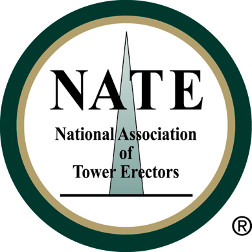NATE on the Front Lines of Wireless Innovation
WATERTOWN, S.D.—Advances in wireless are changing the landscape and delivery models for industries as diverse as health care, financial services, higher education, agriculture, energy, aviation, utilities, public safety, government and the military.
Did you know that the National Association of Tower Erectors (NATE), a national trade organization, is providing the “muscle” behind this mobility revolution? NATE’s 800 + member companies are playing a prominent role as wireless infrastructure service and equipment providers in order to enable this global connectivity.

This enhanced technology is vital to meet both our present and future broadband needs and society’s insatiable thirst for data consumption. According to annual survey results released by CTIA – The Wireless Association, Americans used 9.6 trillion megabytes (MB) of data in 2015. This data usage is three times the 3.2 trillion MB of data utilized in 2013. The CTIA data compared this growth to the equivalent of consumers streaming 59,219 videos every minute or roughly 18 million MB!
Additionally, according to a report from the Progressive Policy Institute (PPI), next generation wireless networks have the potential to add roughly $2.7 trillion to the U.S. gross domestic product by 2030. This figure equates to an average annual growth boost of 0.7 percent or an overall increase of 11 percent in economic output.
NATE member companies are on the front lines in terms of deploying these next generation communications networks. Just how exactly are NATE member companies helping provide this wireless future? Consider the following areas of critical importance to the future of mobility:
FCC 600 MHZ Incentive Auction
As everyone in the wireless and broadcast industries are acutely aware, the Federal Communications Commission (FCC) is conducting a 600 MHZ Incentive Auction in order to free up valuable low band radio waves spectrum currently held by broadcasters. This 600 MHZ spectrum is often referred to as “beach front property” because airwaves operating in this band can travel longer distances and provide better in-buidling coverage.
The professional video industry's #1 source for news, trends and product and tech information. Sign up below.
Upon the conclusion of this innovative auction, NATE’s contractor companies and equipment supplier members will be called on to “repurpose” the spectrum by deploying the new antennas and wireless equipment on communications structures located across the United States. This important infrastructure work will help pave the way to enable emerging technologies and networks that are capable of meeting the country’s connectivity and data needs moving forward.
FirstNet Public Safety Broadband Network
NATE members will also be playing a critical role in the build-out of FirstNet, the country’s first nationwide broadband network devoted exclusively to public safety. When the FirstNet build-out is ready to begin, NATE member companies will be helping provide the wireless infrastructure services and equipment necessary to make this network a reality. FirstNet will ultimately help save lives and provide law enforcement officials, fire fighters and EMS personnel with the critical communications capabilities and resources they need to respond to emergency situations.
Unmanned Aerial Systems (UAS) Technology
NATE is also playing a proactive role in monitoring the trends and regulatory environment associated with rapidly evolving Unmanned Aerial Systems (drone) technologies and making recommendations to the wireless and broadcast infrastructure community on best practices when it comes to UAS integration. UAS technologies, if integrated appropriately, can play a supplemental role in enhancing safety and quality in the industry as well as contribute to the vital economic, public safety and national security benefits associated with broadband network deployments in the United States.
The Future: 5G Networks
According to the International Telecommunication Union (ITU), it is widely anticipated that 5G (5th Generation) commercial networks will be in the marketplace by 2020. Wireless carriers like Verizon Wireless, AT&T and T-Mobile are already in the process of planning 5G trials in the United States in order to pave the way for this technology. The ITU states that 5G networks will have a peak speed of 20 Gbps (billions of bits per second), or 20 times the peak speed specification of today’s 4G LTE networks, which stands at 1 Gps.
NATE member companies have developed and maintained every generation of communications networks and will help make 5G networks a reality in the future. The next time you utilize your smartphone to watch a YouTube video or stream a movie on Netflix, remember that NATE is on the forefront of making these next generation technologies and modern day conveniences possible.
This story first appeared on TVT's sister publication Radio World.
